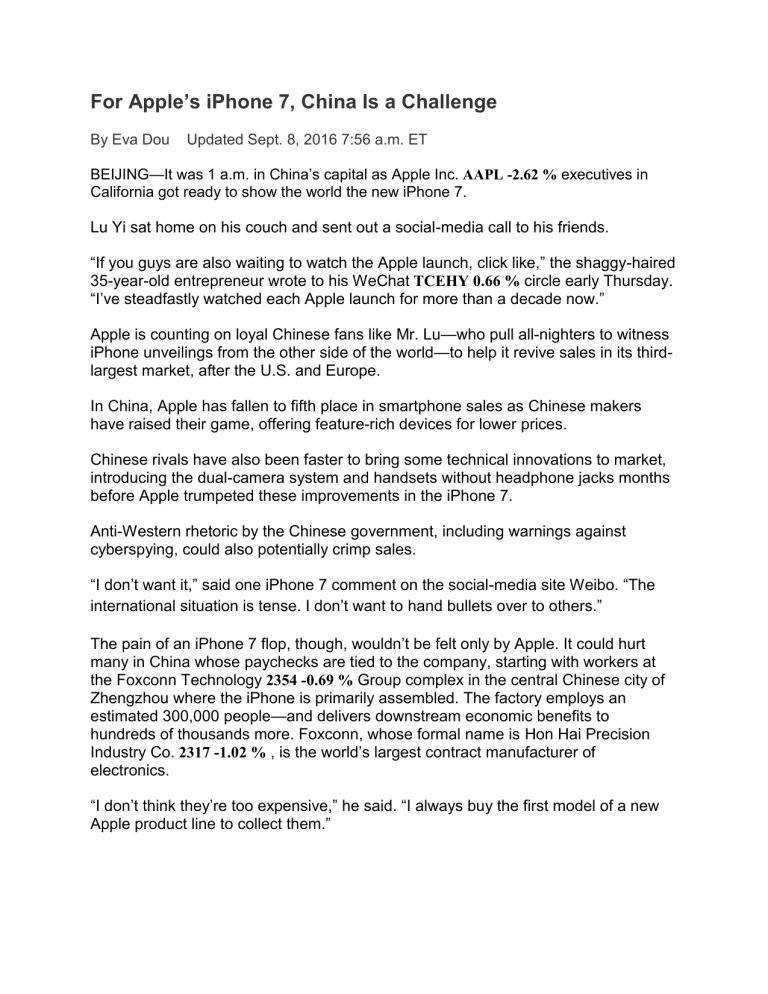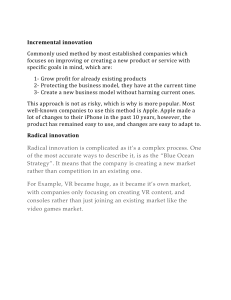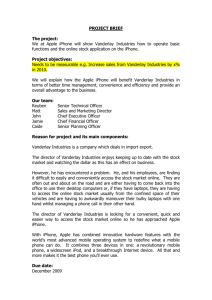
For Apple’s iPhone 7, China Is a Challenge By Eva Dou Updated Sept. 8, 2016 7:56 a.m. ET BEIJING—It was 1 a.m. in China’s capital as Apple Inc. AAPL -2.62 % executives in California got ready to show the world the new iPhone 7. Lu Yi sat home on his couch and sent out a social-media call to his friends. “If you guys are also waiting to watch the Apple launch, click like,” the shaggy-haired 35-year-old entrepreneur wrote to his WeChat TCEHY 0.66 % circle early Thursday. “I’ve steadfastly watched each Apple launch for more than a decade now.” Apple is counting on loyal Chinese fans like Mr. Lu—who pull all-nighters to witness iPhone unveilings from the other side of the world—to help it revive sales in its thirdlargest market, after the U.S. and Europe. In China, Apple has fallen to fifth place in smartphone sales as Chinese makers have raised their game, offering feature-rich devices for lower prices. Chinese rivals have also been faster to bring some technical innovations to market, introducing the dual-camera system and handsets without headphone jacks months before Apple trumpeted these improvements in the iPhone 7. Anti-Western rhetoric by the Chinese government, including warnings against cyberspying, could also potentially crimp sales. “I don’t want it,” said one iPhone 7 comment on the social-media site Weibo. “The international situation is tense. I don’t want to hand bullets over to others.” The pain of an iPhone 7 flop, though, wouldn’t be felt only by Apple. It could hurt many in China whose paychecks are tied to the company, starting with workers at the Foxconn Technology 2354 -0.69 % Group complex in the central Chinese city of Zhengzhou where the iPhone is primarily assembled. The factory employs an estimated 300,000 people—and delivers downstream economic benefits to hundreds of thousands more. Foxconn, whose formal name is Hon Hai Precision Industry Co. 2317 -1.02 % , is the world’s largest contract manufacturer of electronics. “I don’t think they’re too expensive,” he said. “I always buy the first model of a new Apple product line to collect them.” But there is a bigger threat to Apple than wisecrackers: China’s own smartphone makers. Huawei Technologies Co.’s P9 handset had a dual camera months ago, and LeEco in June introduced a phone without a 3.5-millimeter headphone jack. “Who would have thought that Apple has fallen to copying Huawei, LeEco and Oppo?” wrote one Weibo user, referring to Oppo Electronics Corp. With its market share in China ebbing, Apple is hoping to make up some of the difference with bigger sales elsewhere in Asia. In Japan, for the first time, the new iPhone will be able to handle the mobile payments that are so popular there. In India, however, it faces a hurdle: a base price of about $900—some $250 more than the U.S. price before sales tax—partly because of higher distribution costs and builtin taxes. That means Apple still needs to bank on China. Analysts said history suggests the iPhone 7 will likely sell well there for a few months at least, but that it doesn’t seem to have the makings for a smash hit. Chinese consumers like to have smartphones that give them face,” said Mr. Yan, using the Chinese expression for dignity. “They want a phone that clearly looks like the newest version.” “A smartphone is a symbol of your social status, just like cars and clothes,” he said. “It’s especially true for workers in the internet field and foreign enterprises.” Note: WeChat is a social media site and is compared to the “Facebook” of China.





